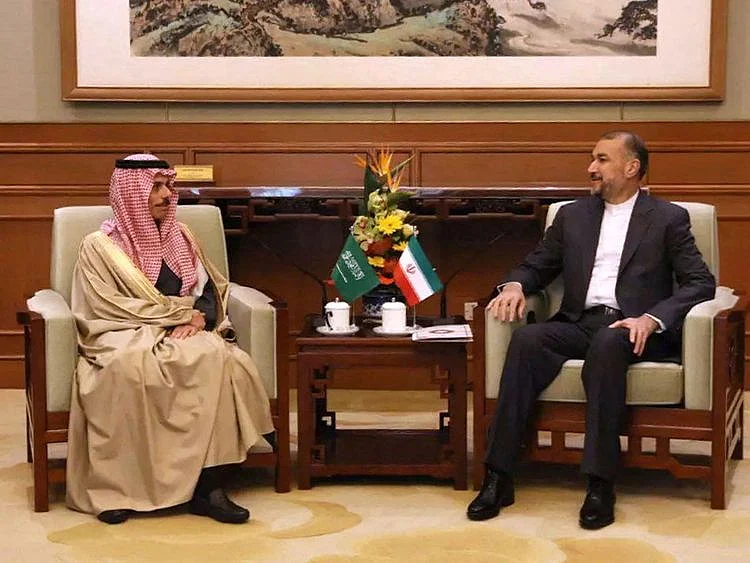Saudi Arabia, Iran agree to reopen embassies, ease travel
Agree to joint agenda that includes economic cooperation, pursuing stability in region

Dubai: Saudi Arabia’s Foreign Minister Prince Faisal bin Farhan and his Iranian counterpart Hossein Amirabdollahian met in Beijing on Thursday, marking the completion of a diplomatic agreement brokered by China last month aimed at normalising relations after years of tensions.
The countries will restore diplomatic relations within the two-month period stipulated in an agreement facilitated by China in March, a joint statement signed by the two countries on Thursday showed.
Iran’s foreign minister said that he and his Saudi counterpart have agreed to a joint agenda that includes economic cooperation and pursuing stability and development in the Middle East.
The two countries will continue coordination to examine ways to expand cooperation, including resuming flights and bilateral visits, in addition to facilitating visas for citizens, they said in the statement.
In a tweet, Amirabdollahian said the meeting in Beijing with his Saudi counterpart was “positive”, adding that “emphasis on stability, sustainable security and regional development” were among the issues agreed upon and “on the common agenda”.
Iran's state news agency, IRNA, released photos and videos showing Saudi and Iranian ministers shaking hands in front of cameras.
According to the Saudi media, the two foreign ministers held "an expanded meeting for the delegations of the two countries in which they discussed the implementation of the agreement on several levels."
Scenes were broadcast showing Chinese Foreign Minister Qin Gang mediating with his Iranian and Saudi counterparts, holding their hands and bringing them together.
Following the meeting, Iran's Foreign Ministry announced that the two foreign ministers focused on the "formal resumption of bilateral relations and executive steps to reopen the embassies and consulates of the two countries."
The Iran-Saudi agreement, announced on March 10, was brokered by China and aims to pave the way for the resumption of diplomatic relations. The meeting in Beijing is intended to "activate" the agreement, according to Saudi media.
It was the first formal meeting of senior diplomats from the two nations since 2016, when the kingdom broke ties with Iran after protesters invaded Saudi diplomatic posts there. Saudi Arabia had executed a prominent Shiite cleric with 46 others days earlier, triggering the demonstrations.
Challenge to US
Iran and Saudi Arabia support rival sides in in Yemen, where the Houthi militia are backed by Tehran and Riyadh leads a military coalition supporting the government.
Riyadh's traditional ally Washington welcomed the detente agreement, but said it remains to be seen whether the Iranians will "honour their side of the deal".
China's success in bringing Iran and Saudi Arabia together has challenged the United States' long standing role as the main outside power broker in the Middle East.
An expert told AFP that Beijing's role would likely increase confidence that any deal would stick. "Because China is a strong backer of Iran, Saudi should have more confidence in Iran's ability to comply with the agreement, an issue that has always been in doubt," said Joel Rubin, former US Deputy Assistant Secretary of State for Legislative Affairs.
Thursday's meeting "suggests that the process hasn't gone off track since the Beijing announcement last month", said Ali Vaez, Director of the International Crisis Group's Iran Project.
"But it's still early days to judge whether this is just a tactical detente or a way-station towards strategic rapprochement."
Warming ties
Officials from Iran and Saudi Arabia held several rounds of dialogue in Baghdad and Oman before they met in Beijing.
In 2016 a number of Gulf countries followed Riyadh's action in scaling back ties with Tehran, but they have led the way in restoring diplomatic relations.
Iran welcomed an Emirati ambassador last September, after a six-year absence, and on Wednesday named its own ambassador to the UAE, following a nearly eight-year hiatus.
Last year Iran said Kuwait had sent its first ambassador to Tehran since 2016.
Iran has also welcomed a potential rapprochement with Bahrain, a close Saudi ally, which in the past accused Iran of backing a Shiite-led uprising in the Sunni-ruled kingdom, an accusation Tehran denies.
Sign up for the Daily Briefing
Get the latest news and updates straight to your inbox
Network Links
GN StoreDownload our app
© Al Nisr Publishing LLC 2025. All rights reserved.